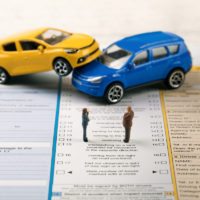What to Do After a Car Accident in California

Navigating California roadways requires defensive (not aggressive, ahem) driving. Despite our best (or not so best) efforts, car accidents happen. When they do, drivers and passengers are forced to deal with local and state authorities, deep-pocketed insurance companies and aggressive lawyers who oftentimes leave drivers with a lot of unanswered questions.
Below is a general list of steps to take after a car accident:
- Once your vehicle comes to rest, make sure you and your passengers are not injured. If anyone is injured, call 9-1-1 immediately and do not hang up until the emergency dispatcher tells you to do so. To avoid causing further injuries, be sure not to move an injured person unless he/she is in danger of fire or other emergency circumstances.
- If no one is injured and the vehicles are drivable, agree to move the vehicles to the side of the road. If time, safety factors and traffic allow, take a picture of the vehicles before and after moving them (most cell phones have internal cameras).
- Your adrenaline will be running high but try to keep calm and not to yell at other drivers involved in the accident – everything you say will likely be documented in the police report from the other drivers or witnesses. The California Highway Patrol also suggests that you do not accept or place any blame for the accident on anyone and that you instead leave that determination to your insurance company.
- If you have not called 9-1-1 already, call the local police or California Highway Patrol to report the car accident.
- Then, obtain the following information from the other driver: driver’s name, address, date of birth, license number and state; driver’s vehicle license plate number and state; driver’s insurance company name, policy number and expiration date; policy holder’s name and address; vehicle owner’s name and address; and whether the other driver (and passengers) received any injuries or property damage. Try to physically exchange this information to ensure you accurately copy the information contained on the cards and if the other driver is unlicensed or uninsured, immediately call the police and report that information.
- If there are any witnesses to the car accident, be sure to kindly ask them not to leave and obtain their full name, address, home/work telephone number and email address. A witness can bolster your recollection of the accident and/or diminish the other driver’s recollection of the accident
- Often times the stress of an accident will force you to forget important information that may be relevant later. Before leaving the scene, take a moment to write down exactly how the accident happened and include information such as: approximate speeds of all vehicles, weather conditions, erratic behavior of the other driver, how your body physically reacted to the collision, whether your glasses were knocked off your head, whether the other driver apologized or said anything regarding liability and injuries (or lack thereof), the condition of the roadway, whether a traffic light was out, whether the other driver was wearing sunglasses or a hat, whether the other driver was listening to loud music and whether you could hear that music, etc.
- When you get home, report the accident to the DMV (you must do so within 10 days if someone was injured, killed or if property damage exceeds $750) and call your insurance company to make an insurance claim (which notifies your carrier of the car accident). Do not provide any statements, photographs or documents to anyone and do not sign any liability waivers or medical record releases until you have had an opportunity to speak with a personal injury attorney. Most personal injury attorneys offer a free initial consultation. Even if you do not want to pursue a legal claim, most attorneys will charge a minimal fee to simply provide advice on whether insurance settlement offers are reasonable and to ensure that you are not being taken advantage of.
- If you were injured in the car accident, keep a daily journal of how you are feeling, both mentally and physically, after the accident. Likewise, from the very first hospital or doctor visit, keep a log of all appointments and medical facilities that you attended as a result of the accident and include comments from your physicians regarding your injuries, diagnosis and prognosis. Also, keep a log of the days you had to miss work as a result of the accident (because of pain, lack of transportation and/or doctor visits).
The Minimum Car Insurance Policy Limit
To protect yourself and others, make sure you maintain the minimum automobile insurance policy limits at all times — the minimum limit in California is $15,000 for a single death or injury; $30,000 for death or injury to more than one person; and $5,000 for property damage caused by one accident. You may also want to look into obtaining uninsured motorist and underinsured motorist coverage on your own policy.
Drive safely and defensively, Californians!
